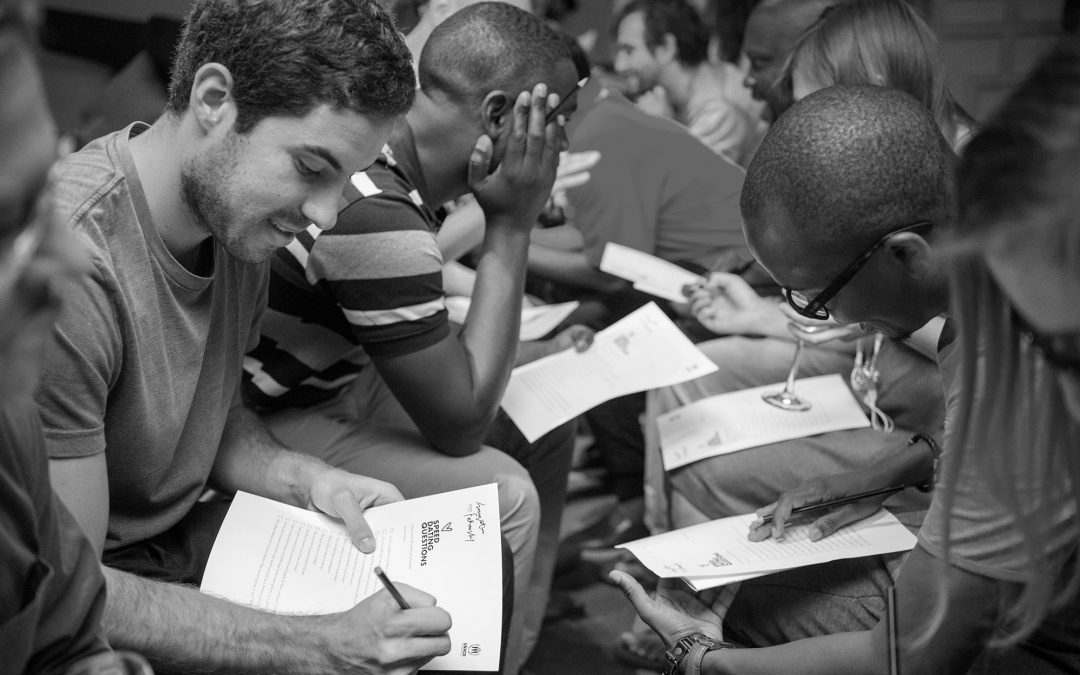For the first time last year, the UNHCR Innovation Service opened its Fellowship to applicants from an outside organization: Medecins Sans Frontieres. Even though Cary Lewis was a relatively new information manager there, he saw an opportunity to develop skills that would help him improve information sharing throughout MSF.
Lewis wanted to tackle a straightforward problem he had noticed; people weren’t sure what information MSF had or how they could access it. Instead of finding resources like human resource policies and IT information in an accessible place on the intranet, they were emailing back and forth trying to figure out where to look or find the most updated version. It took up time and caused people to recreate the efforts of others.
He applied to the UNHCR Innovation Fellowship to see if he could gain a few tools to start addressing it.
For Lewis, a newcomer to humanitarian work with experience at a headquarters level, the Innovation Fellowship’s initial workshop in Bangkok allowed him to interact with people who’d been in the humanitarian system for much longer, and with UNHCR employees who’d worked in the field for years. “It was good to have their perspective of what kind of challenges they were facing and what ideas they had for improving the situation in the field,” he says.
The innovation approach he learned was not entirely unfamiliar to Lewis, who likens it to developing and implementing new technology. “The innovation is about working with the user, the person who’ll be using your end product,” he says. “And with technology it’s similar… In that sense, it’s still stressing the importance of understanding their needs completely.”
But Lewis says he learned a great deal about different approaches, better thinking and more robust questioning that allowed him to recognize unspoken needs that people’s questions didn’t capture. “The iterative feedback was really key, also,” he says. “It forced me to think more about what people need, not just what they’re asking, so you can drive further with your question.”
Before settling on a solution, Lewis conducted interviews with nearly 25 colleagues in order to review the state of knowledge management at MSF and get a sense of where improvements might be most helpful.
“I want to hear from everyone, no matter their level, from a typical worker all the way up to our directors,” he says. “Everyone has an important role to play, and I liked that inclusion of perspectives.”
He followed up the interviews with a two-day workshop with about 20 of the interviewees to consider various suggestions and narrow in on where to focus efforts.
Lewis had high-level buy-in from MSF to participate in UNHCR’s Innovation Fellowship. But he says he still faced challenges, especially from those whose work habits and way of thinking are ingrained. Improving the intranet had not really been seen as a priority issue for MSF. And Lewis wanted to make it one.
“A lot of the work we have to do is grassroots campaigning to get the change done,” he says. “You’re working within the framework of how staff and management are used to working. I have to work with missions and we’re slowly trying to change the way they work with their information.”
To that end, Lewis continues to implement and refine pilot projects incrementally. He’s working on a project that includes inter-organizational project and knowledge-sharing. He’s been working with six of MSF’s organizational “cells” to create new protocols and intranet updates. A highlight came when one of the cells it would no longer use email to send information about documentation: staff could find everything they needed on the intranet.
“That was a really nice achievement,” says Lewis, “because it was the recognition of the new protocol being put in place and how it would help the entire cell and mission exchange information in a creative format and a way that would improve their information management.”
Lewis credits UNHCR Innovation staff for the thinking behind the approach they helped him master, as well as the camaraderie and acceptance he felt as the sole outsider. A member of the MSF innovation group, he’s now contributing to his own organization’s planned innovation fellowship. “It really reinvigorates the drive that you have for the mission,” Lewis says.
Changing big systems is hard. It takes a lot for an organization to carve out time and effort when there are so many competing priorities and challenges. Lewis says sometimes he feels like a door-to-door salesman. But on the whole, he sees progress.
“It’s finding those areas where you can work,” Lewis says, “pushing and driving forward, step by step, slowly.”
We’re always looking for great stories, ideas, and opinions on innovations that are led by or create impact for refugees. If you have one to share with us send us an email at innovation@unhcr.org
If you’d like to repost this article on your website, please see our reposting policy.

